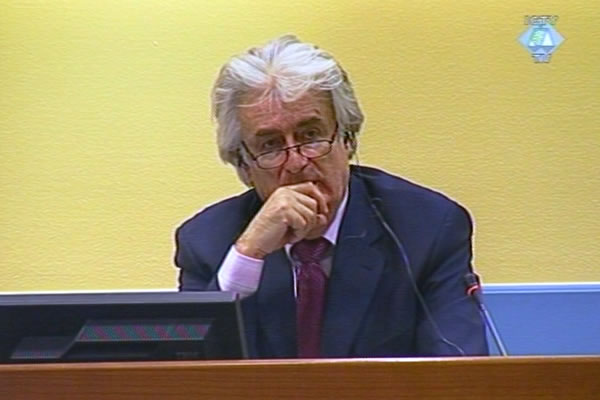Home
KARADZIC GETS DEFENSE COUNSEL
The Trial Chamber has ordered the ICTY Registrar to appoint defense counsel to represent the interests of the accused, in case that Karadzic makes another attempt in any way to obstruct the proper and expeditious conduct of the trial, scheduled to continue on 1 March 2010
 Radovan Karadzic in the courtroom
Radovan Karadzic in the courtroom
The Trial Chamber hearing the case against Radovan Karadzic has decided to impose defense counsel on the accused, because of his ‘substantial and persistent obstruction of the proper and expeditious conduct of the trial’. The Registrar has been ordered to assign counsel who will ‘prepare to represent the interest of the accused at trial’ subject to further order of the Chamber. The Chamber has also invited the Registry and the Prosecution to take all necessary measures, including the submission of relevant documents to facilitate the preparation of assigned counsel for the trial, scheduled to continue on 1 March 2010.
The appointed counsel will act as ‘stand-by counsel’, although this is not specifically stated in the decision. As the trial continues, Karadzic will continue to represent himself, and the appointed counsel will attend the hearings, ready to step in and take over the defense when ordered to do so by the judges. As indicated in the decision, the judges will issue that order if next March the accused again refuses to appear in court or "obstructs in any other way the proper and expeditious conduct of the trial". In that case, Karadzic will be stripped of his right to self-representation and will not longer be entitled to assistance from his team of legal advisers. The appointed counsel will take over his defense. Although it is not explicitly stated in the decision, the implication is that the trial, if the accused refuses to appear in court, will proceed in his absence.
The Trial Chamber had considered the option of the trial continuing now in the absence of the accused and any counsel, but concluded that that would not serve the interests of justice or the interests of truth-seeking, because no evidence would be called by the defense; this evidence might contest the prosecution case. The interests of justice and truth-seeking dictate that the entirety of the evidence be called before the court, the judges concluded.
According to the earlier decisions of the Appeals Chamber in the Seselj case, the Registrar should first ask the accused to propose the name of a lawyer he would like to have assigned. If the accused refuses to do so, the Registrar will choose and appoint one of the hundred or so lawyers qualified to defend the accused before the Tribunal.
Linked Reports
- Case : Karadzic
- 2009-11-03 PROSECUTION: KARADZIC CAN BE COMPELLED TO ATTEND TRIAL
- 2009-11-02 KARADZIC AND SREBRENICA GENOCIDE
- 2009-10-27 KARADZIC VS. KARADZIC
- 2009-11-11 KARADZIC APPLIES FOR CERTIFICATION TO APPEAL AGAINST DECISION TO IMPOSE COUNSEL
- 2009-11-20 RICHARD HARVEY APPOINTED KARADZIC’S COUNSEL
- 2009-11-23 KARADZIC'S APPLICATION FOR CERTIFICATION TO APPEAL DENIED
